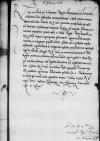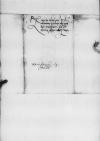Letter #2705
Samuel MACIEJOWSKI to Ioannes DANTISCUSPiotrków, 1544-02-16
| received Heilsberg (Lidzbark Warmiński), 1544-02-23 Manuscript sources:
| ||||
Text & apparatus & commentary Plain text Text & commentary Text & apparatus
Reverendissimo in Christo Patri et Domino, domino
Reverendissime in Christo Pater et Domine, amice carissime ac honoran(de) or honoran(dissime)⌈honoran(de)honoran(de) or honoran(dissime)⌉.
Salutem et sui officiosam commendationem.
Causa, quam commendavit mihi suis cf.
Valere Vestram Reverendissimam Dominationem cupio bene.
Datum
Vestrae Reverendissimae Dominationis frater et servitor


 BCz, 1599, p. 394
BCz, 1599, p. 394